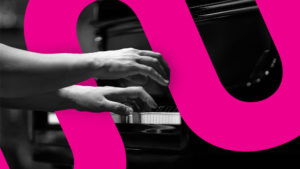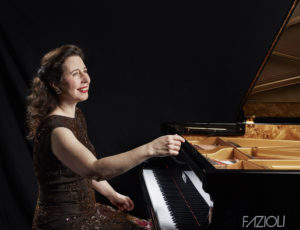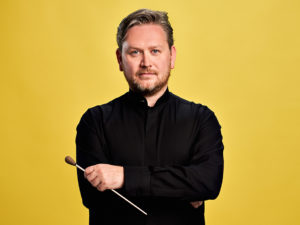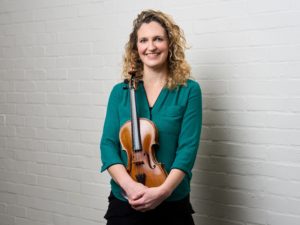
The Ages of Mozart: Angela Hewitt

The Ages of Mozart: Angela Hewitt
I Molto Allegro
II Andante
III Presto
Mozart arrived in London in April 1764 on an extensive tour that had taken him and his family to Paris, Brussels and several German towns. He and his sister Nannerl had been acclaimed at various courts and in public, and their father Leopold, who organised the concerts and occasionally took part in them, had every reason to be pleased with the financial success of the tour.
When Mozart came to England he was eight years old. He had begun composing seriously at the age of six, and during the year he spent in London he studied composition with Johann Christian Bach, the youngest son of Johann Sebastian. This ‘English’ Bach and Karl Friedrich Abel (a pupil of J S Bach) were the dominant figures in the musical life of London at the time. J C Bach recognised Mozart’s exceptional talents and guided his rapid progress in composition more like a fatherly friend than a teacher. It was inevitable that the early symphonies of his pupil followed the pattern that J C Bach and others had developed from the Italian overture. But Mozart never merely copied other composers. He absorbed only those influences that furthered the development of his genius, and these he made his own.
Mozart and his family stayed in Chelsea, a suburb of London at the time, during the summer of 1764, which meant a less busy life for little Wolfgang and it allowed him to try his hand at composing his first symphony. His Symphony No. 1, K16, lacks the depth and thought of his more mature works, but it has none of those awkward moments one would expect in the composition of a child. The musical forms are concise and well proportioned and, though there is virtually no symphonic development, the ideas are treated in that instinctive manner that later became a feature of Mozart’s most profound compositions.
I Allegro
II Andantino
III Rondo: Presto
The number 9 for the Concerto in E flat disguises the fact that Mozart’s first seven concertos were arrangements of piano sonatas by C P E Bach, J C Bach and others. His first independent piano concerto was the Concerto in D major, K175, written when he was 17. Three more followed in early 1776 before he wrote this concerto in Salzburg in January 1777, the month of his 21st birthday.
Although the Concerto in E flat has been known for nearly a century as the Jeunehomme Concerto, it has recently come to light that it was written for Victoire Jenamy, the daughter of one of Mozart’s friends, and is therefore the Jenamy Concerto.
Nothing in his previous piano concertos prepares us for the sheer brilliance and invention of the Concerto in E flat. In all three movements he expands the form and breaks the constraints of the pre-classical concerto, and bubbling along throughout is the energy and inspiration of his new maturity as a composer.
Innovation is apparent from the very beginning, when the piano immediately interrupts the orchestra with a fanfare figure. This sets the tone for constant spirited exchange between the orchestra and piano. Another startling aspect of the first movement is that the themes are not only used throughout the movement but that they develop from naïve orchestral tunes to highly pianistic and virtuoso-sounding melodies. The development section holds an astounding passage in which the oboes and piano are entirely unsupported and the horns have a chance to display their mellowest register in the recapitulation.
This Concerto has a grandeur that belies the small forces – two oboes, two horns and strings – that Mozart employs and nowhere is this more evident than in the Andantino, which has its roots in opera. Through muted strings and contrapuntal imitation between the violins, Mozart sets the stage for the soloist’s impassioned aria. The key of C minor suffuses the movement with a profound pathos, in contrast to the freshness of the outer two movements.
Although the Rondo seems to owe much to Haydn, it is ground-breaking in its invention and virtuosity. The biggest surprise is the menuetto cantabile in the middle of the movement, although in every way Mozart develops this minuet much further than standard dance form. The originality continues to the end as the orchestra gets quieter and quieter before the final loud chords.
© Elizabeth Boulton
I Adagio – Allegro spiritoso
II Poco Adagio
III Menuetto
IV Presto
Mozart and his wife Constanze (they were married in August 1782) visited Linz in the autumn of 1783 on their return journey from Salzburg to Vienna. They arrived at the end of October and stayed three weeks as the guests of Count Thun. The visit to Salzburg had been disappointing. Mozart’s father had always opposed the marriage of his son, and meeting Constanze did little to alter his opinion of her. The relations between him and the young couple remained strained, to say the least. It was therefore hardly surprising that both Constanze and Mozart felt more at ease in Linz where they had friends, where Mozart’s music was admired and where he could feel free from the domination of a father whom he loved, but who refused to accept that at the age of 27 his son was no longer a child. Soon after his arrival in Linz it must have been decided that Mozart should give a concert. “On the fourth of November,” he wrote to his father, “I shall give an Academy (benefit concert) at the theatre here. And since I have not a single symphony with me, I am writing one hurriedly which must be ready by then.” This left only four days to complete the work. It was indeed ready by 4th November and Mozart dedicated the symphony to Count Thun.
The Linz Symphony, written in and for that city, showed what Mozart could do when he felt he was appreciated, and the limited time at his disposal presented him with an additional challenge. Confident and inspired as he undoubtedly was, he composed in Linz the most ambitious symphony he had written so far.
As the resident orchestra included trumpets and drums, Mozart used them extensively. He wrote, against his usual practice at that time, a slow introduction to the first movement, and a Menuetto important enough to balance the considerable dimensions of the symphony. The slow introduction and the second movement have their moments of mystery, but on the whole the work reflects Mozart’s happy state of mind which, after the sad experience in Salzburg, he had found once more in Linz. This positive mood is evident in the finale, particularly when the simple theme of a broken common chord makes the most unexpected and humorous appearances.
© Stefan de Haan
Leader
Ruth Rogers
Violin 1
Sijie Chen
Jessica Coleman
Nicoline Kraamwinkel
Anne Criscuolo
Violin 2
Antonia Kesel
Gemma Sharples
Clare Hayes
Jeremy Metcalfe
Viola
Judith Busbridge
Christine Anderson
Sophie Renshaw
Cello
Sebastian Comberti
Leo Popplewell
Double Bass
Benjamin Russell
Oboe
Christopher O’Neal
Katie Clemmow
Bassoon
Sarah Burnett
Emma Harding
Horn
Mark Paine
Martin Grainger
Trumpet
Anthony Thomas
Peter Wright
Timpani
Benedict Hoffnung
CHIEF EXECUTIVE
Flynn Le Brocq
CONCERTS
Artistic Projects Manager Sophie Haynes
Orchestra Manager & Fixer Jason Weir
Artistic Projects Coordinator Alex Mackinder
DEVELOPMENT
Development Manager Tristen Hennigs
Fundraising & Operations Peter Wright
Fundraising Consultant Paul Hudson
Outreach & Evaluation Consultant Bec Britain
Honorary Chair – Friends of LMP Christine Robson
MARKETING
Senior Marketing & PR Manager Anna Bennett
Marketing and Development Coordinator Bethany Penny
Digital Marketing Manager Charles Lewis
EVENTS
Royal Event Manager Rachel Rae
Freelance Events Producer Sophie Branscombe
FINANCE
Bookkeeper Debbie Charles
Leader Debbie Beckerman & Keith Jones
Leader Raymond and Rosamund Calcraft
Co-Leader Michael Southwell
Violin 1.3 Liz and Alistair Milliken
Violin 1.4 currently not sponsored
Violin 1.5 Christine Robson
Violin 1.6 Della Brotherston
Violin 1.7currently not sponsored
Violin 1.8currently not sponsored
Violin 1.9 currently not sponsored
Associate First Violin currently not sponsored
Principal Second Violin currently not sponsored
Violin 2.2 The Angel Family
Violin 2.3 Mia and Keith Ball
Violin 2.4 Alastair Fraser
Violin 2.5 currently not sponsored
Violin 2.6 Catherine Shaw – Allbone and Trimit
Associate Second Violin currently not sponsored
Principal Viola Mark and Vanessa Petterson
Co-Principal Viola currently not sponsored
Viola 3 Gill Cox
Viola 4 currently not sponsored
Associate Viola currently not sponsored
Principal Cello Anonymous
Sub-Principal Cello Leslie Aarons
Cello 3 Gillian Noble
Cello 4 Richard Morgan
Associate Cello Colin and Helen Snart
Associate Cello currently not sponsored
Principal Double Bass John Clarke
Co-Principal Double Bass The Bristow Family
Principal Flute currently not sponsored
Sub-Principal Flute currently not sponsored
Principal Oboe Pat Sandry
Co-Principal Oboe currently not sponsored
Sub-Principal Oboe currently not sponsored
Principal Clarinet Deirdre Lea
Sub-Principal Clarinet Graham Harman
Principal Bassoon currently not sponsored
Sub Principal-Bassoon Barbara Tower
Principal Horn currently not sponsored
Sub-Principal Horn Chris Harman
Principal Trumpet Ishani Bhoola
Sub-Principal Trumpet Cynthia Harrod-Eagles
Principal Trombone currently not sponsored
Sub-Principal Trombone currently not sponsored
Principal Bass Trombone currently not sponsored
Principal Timpani Cynthia Harrod-Eagles
Principal Percussion currently not sponsored

French Connections: Music from the Parisian Stage
Thursday 13 February 2025, 7.30pm
St. Martin-In-The-Fields
We bring you the music that made it big in the fashionable French capital including works by Ravel, Debussy and young Mozart.
Angela Hewitt
piano/director

One of the world’s leading concert pianists, Angela Hewitt appears in recital and as soloist with major orchestras throughout Europe, the Americas, Australia, and Asia. Her interpretations of the music of J.S. Bach have established her as one of the composer’s foremost interpreters of our time.
Born in 1958 into a musical family (the daughter of the Cathedral organist and choirmaster in Ottawa, Canada), Angela began her piano studies age three, performed in public at four and a year later won her first scholarship. In her formative years, she also studied classical ballet, violin, and recorder. From 1963-73 she studied at Toronto’s Royal Conservatory of Music with Earle Moss and Myrtle Guerrero, after which she completed her Bachelor of Music in Performance at the University of Ottawa in the class of French pianist Jean-Paul Sévilla, graduating at the age of 18. She was a prizewinner in numerous piano competitions in Europe, Canada, and the USA, but it was her triumph in the 1985 Toronto International Bach Piano Competition, held in memory of Glenn Gould, that truly launched her international career.
Angela’s award-winning cycle for Hyperion Records of all the major keyboard works of Bach has been described as “one of the record glories of our age” (The Sunday Times). Begun in 1994, it culminated with her much-awaited recording of Bach’s Art of Fugue in 2014. Her extensive discography also includes solo recordings of the complete Beethoven Sonatas (she is one of very few women ever to record the complete cycle), Scarlatti, Handel, Couperin, Rameau, Haydn, Chopin, Schumann, Liszt, Fauré, Debussy, Chabrier, Ravel, Granados and Messiaen. She has won four Juno Awards, including one for her album of Mozart Concertos with Canada’s National Arts Centre Orchestra. Other concerto recordings include the complete Bach Concertos with the Australian Chamber Orchestra; the works for piano and orchestra of Schumann with the Deutsches Symphonie-Orchester Berlin; and Messiaen’s mammoth Turangalila Symphony with the Finnish Radio Symphony Orchestra. She is now recording the complete Mozart Piano Sonatas, and the first of three double-CD albums will be released in November 2022. A regular in the USA Billboard chart, her new album Love Songs hit the top of the specialist classical chart in the UK and stayed there for months after its release. In 2015, Angela was inducted into Gramophone Magazine’s “Hall of Fame”, reflecting her popularity with music lovers around the world.
In 2020 she was awarded two prestigious prizes: the City of Leipzig Bach Medal (being the first woman in its 17-year history to receive the award), and the Wigmore Hall Gold Medal in recognition of some 80 performances over the past 35 years in London’s most prestigious chamber music venue.
During the 2007-2008 season, Angela embarked on her Bach World Tour, performing the Well-Tempered Clavier in 21 countries on six continents. At the same time, she released a DVD entitled Bach Performance on the Piano, sharing her experience of learning and performing Bach with amateurs and professionals alike. From September 2016 to September 2022 (the end delayed two years due to the Covid-19 pandemic) she presented in major cities of the world The Bach Odyssey—performing all the keyboard works of J.S. Bach in a series of twelve marathon recitals—a huge feat which has been undertaken by very few keyboard players. After her performances of the complete Well-Tempered Clavier at the 2019 Edinburgh Festival, the critic of the London Times wrote, “…the freshness of Hewitt’s playing made it sound as though no one had played this music before.”
Conducting concertos of Bach, Mozart, and Beethoven from the piano, Angela has led the Toronto Symphony, the Hong Kong Philharmonic, the Copenhagen Philharmonic, the Lucerne Festival Strings, the Kammerorchester Basel, the Vancouver Symphony, the Stuttgart Chamber Orchestra, the Britten Sinfonia, the Swedish Chamber Orchestra, the Zurich Chamber Orchestra, the Salzburg Camerata, the orchestra of RAI Torino, the Orchestra Ensemble Kanazawa in Japan, and in 2019 made her debut playing and conducting Bach with the Vienna Tonkünstler Orchestra in Vienna’s Musikverein.
Along with performing a vast amount of the standard repertoire, Angela has also commissioned new works including two piano concertos: the Second Piano Concerto of Dominic Muldowney (premiered with the BBC Symphony in 2002); and in 2017 “Nameless Seas” by Canadian-Finnish composer Matthew Whittall (with the National Arts Centre Orchestra). Canadian composers such as Oskar Morawetz, Steven Gellman, Gary Kulesha, David McIntyre, and Patrick Cardy also wrote pieces dedicated to her. In 2010 she commissioned seven composers from around the world to write short pieces inspired by Bach which were published in a collection (along with several of her own Bach transcriptions) entitled “Angela Hewitt’s Bach Book”. In February 2022 she was presented with The Oskar Morawetz Award for Excellence in Music Performance by the Ontario Arts Council.
Described as “one of the busiest pianists on earth” by London’s Evening Standard (2005), Angela also devotes herself to nurturing new talent. Her masterclasses, both around the world and online, are hugely appreciated, and every few years she gives a week-long masterclass in Italy for gifted pianists. She was also part of Piano Six from 1994-2004: a project which took live music into the remote communities of Canada—giving concerts, masterclasses, and playing for school children across the country. Her writings on music include all the liner notes for her CD recordings as well as several book reviews for the Times Literary Supplement.
In 2005, Angela launched the Trasimeno Music Festival in the heart of Umbria, Italy of which she is Artistic Director. An annual event, it draws an international audience to stunning venues including the Castle of the Knights of Malta in Magione (near Perugia) on the shores of Lake Trasimeno. Seven concerts in seven days feature Hewitt as recitalist, chamber musician, song accompanist, and conductor, working with both established and young artists of her choosing. Involving writers and actors in the programming has been a particular pleasure for her, and she has gone on to perform with many of them elsewhere: with authors Ian McEwan and Julian Barnes in London, Vienna, and New York; and with actor Roger Allam in Venice and at Shakespeare’s Globe in London. Her recordings and live performances have featured in such films as The Tree of Life (2011), The Life Aquatic (2004), The Impassioned Eye (2003)—a documentary on Henri Cartier-Bresson—and in 2018 The Children Act (based on the novel by Ian McEwan and starring Emma Thompson).
As an Ambassador for “Orkidstra”– a Sistema-inspired social development program in Ottawa’s inner city, she brings attention to how music can bring children and young adults together through the joy of making music and learning an instrument, as well as how it teaches valuable skills such as commitment, teamwork and tolerance.
Her frequent masterclasses are hugely appreciated. When all concert activity abruptly stopped in spring 2020 due to the pandemic, Angela went online to share daily offerings of short pieces—many of which form the basis of teaching material. Her fans were thrilled, and she was happy to inspire them and stay in touch.
In July 2022 Angela was Chairman of the Jury of the prestigious International Bach Competition in Leipzig (piano category). The upcoming 2022-23 season sees her performing with orchestras in Finland, Denmark, Montreal, Ottawa, Victoria BC, Prague, Germany, and the Orpheus Chamber Orchestra in New York. Recitals take her to, among others, Barcelona, San Francisco, Seattle, Vienna, Amsterdam, Cambridge, Leipzig, and the famous La Fenice Opera House in Venice. She will give masterclasses for young pianists at the Royal College of Music, London, at the Lunenburg Academy of Music Performance (Nova Scotia), at Northwestern University (Illinois) and the College of St. Scholastica in Duluth, Minnesota. She is also an artist-in-residence at London’s Wigmore Hall.
In 2006 Angela was awarded an OBE from Queen Elizabeth II in her 80th birthday honours. A frequent guest on BBC Radio, she was invited to be the sole live performer in the two hours of classical music broadcast on BBC Radio 3 immediately following the funeral and committal of Queen Elizabeth II on September 19, 2022. In 2015 Angela was promoted to a Companion of the Order of Canada—her country’s highest honour. She was “Artist of the Year” at the 2006 Gramophone Awards, “Instrumentalist of the Year” at the 2010 MIDEM Classical Awards at Cannes, and in 2018 received the Governor General’s Lifetime Achievement Award in Ottawa. She is a member of the Royal Society of Canada, has seven honorary doctorates, and is a Visiting Fellow of Peterhouse College, Cambridge.
Jonathan Bloxham
conductor in residence and artistic advisor

After first debuting with the orchestra in 2020 this season Bloxham begins his tenure as Chief Conductor of the Nordwestdeutsche Philharmonie following in the footsteps of Andris Nelsons and Jonothan Heyward, and conducting concerts on two German tours as well as in their subscription season in Herford. In 2021 he recorded a CD of Strauss and Franck with the orchestra, described as “irresistible” by Musicweb International.
Conductor in Residence and Artistic Advisor of the London Mozart Players since 2022, Bloxham continues his close relationship with the orchestra this season, leading their concert series at St Martin-in-the-Fields and Fairfield Halls, and on a four-concert Swiss tour. Last season they celebrated the orchestra’s 75th birthday with a recreation of Mozart’s 1783 Vienna concert, and marked Croydon’s year as Borough of Culture with ambitious multi-disciplinary community projects.
Guest highlights of the past couple of seasons have included London Philharmonic, NDR Elbphilharmonie, Tokyo Symphony, Salzburg Mozarteumorchester, Halle Orchestra, BBC Symphony, Belgian National, Residentie Orkest, Tonkuenstlerorchester Wien at the Grafenegg Festival, Bonn Beethovenorchester, Trondheim Symphony and Philharmonic Brass (musicians from Berlin and Vienna Philharmonic orchestras) – many of these on multiple occasions. This season he returns to the BBC Symphony to conduct Wagner and Charles Ives, conducts the BBC Philharmonic in an opera gala, and debuts at the Enescu Festival with the Romanian National Radio Orchestra.
In 2024 Bloxham released a recording of Bach’s Keyboard Concertos with the Academy of St Martin in the Fields and Tianqi Du, which reached number one on the Apple Classical Top 100 global chart. He has also recorded works by Bruce Broughton with the London Symphony Orchestra (2024), as well as discs for future release with the BBC Scottish Symphony (2022) and London Mozart Players (2023).
Bloxham’s conducting career was launched in 2016 when he took up the Assistant Conductor position at the City of Birmingham Symphony Orchestra under Mirga Grazynte-Tyla. Before taking up conducting he enjoyed a prolific career as a cellist, performing regularly at the Wigmore Hall and across Europe, making his concerto debut at the Berlin Philharmonie in 2012. He learnt cello at the Yehudi Menuhin School, Royal College of Music and then at the Guildhall School of Music and Drama (Master’s), and later took conducting studies with Sian Edwards, Michael Seal, Nicolas Pasquet and Paavo Järvi.
For the past 16 years Bloxham has been Artistic Director of the Northern Chords Festival based in Newcastle-upon-Tyne, commissioning new works from young composers such as Vlad Maistorovici, Jack Sheen and Freya Waley Cohen. He returns to the Festival in 2025.
Ruth Rogers
leader

Ruth Rogers studied with Itzhak Rashkovsky and Herman Krebbers. Described as “the finest of the younger generation of violinists” (Musical Opinion) and hailed by the Guardian as “superb”, Ruth is in demand as soloist, leader, and chamber musician. She was awarded the Tagore Gold Medal – the Royal College of Music’s highest accolade. She appears regularly at such prestigious venues as The Wigmore Hall with Aquinas Piano Trio and has made many recordings as part of that ensemble, including recent releases by Naxos which have been very well received by the critics.
Ruth was appointed as Leader of the London Mozart Players in 2015 and Leader of the Brighton Philharmonic Orchestra in 2022. She worked as Co-Leader of the Bournemouth Symphony Orchestra from 2008 until 2012 and appears as a guest leader of many other major orchestras including the Hallé, BBC Philharmonic, the City of Birmingham Symphony Orchestra and the Scottish Chamber Orchestra. Ruth has played to orphans, landmine victims and malaria patients in refugee camps on the Thailand-Burma border.
 New Appointment – Jessica Coleman as Violin 1, No.3
New Appointment – Jessica Coleman as Violin 1, No.3 